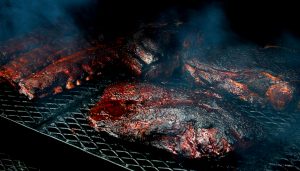Barbecue Pellet Quality

Despite their increase in popularity, there are currently no published standards or any other known guidance for manufacturing and using BBQ pellets.
Read the original post here: https://biomassmagazine.com/articles/15616/barbeque-pellet-quality
From when I first got involved in developing wood pellet standards back in 2005, I recall clients calling to inquire about BBQ pellet standards, and if there were any testing requirements to confirm the quality of the product as a fuel for cooking. Since then, I don’t believe even a whole year has passed without at least one or several similar inquiries. The conversation is always the same. Since BBQ pellets are being used as a fuel to cook food, there is probably something that should be tested or evaluated to verify that BBQ pellets are a healthy fuel to use, and not inordinately causing some type of health risk. While this logic has remained sound, to this day I am not aware of any published quality standards or other requirements for manufacturing and using BBQ pellets.
In 2005, BBQ pellets were not nearly as popular. There were a few companies manufacturing them, but it was relatively uncommon. Fast forward to 2018, and BBQ pellets are being made by numerous companies, and the market has expanded significantly. The topic of BBQ pellets is now something that comes up regularly in publications, at conferences, and in routine conversations. Despite their increase in popularity, the same information holds true, in that, to my knowledge, there are currently no published standards or any other known guidance for manufacturing and using BBQ pellets. This is an issue that has been recognized by the Pellet Fuels Institute, and the conversation of BBQ pellets has begun in concerted fashion with the formation of a PFI BBQ pellet caucus. The efforts are intended to cover all aspects of this burgeoning industry, so if you are interested in being part of the conversation, then I encourage you to contact PFI to see how you can get involved. As a standards developer, I have offered my assistance if it is ultimately decided that BBQ pellet standards are needed.
Independent of an actual BBQ pellet standards project, I have been asked my opinion enough times that I want to convey some of my thoughts in this column. Here are a few things that come to mind when I think of BBQ grilling pellets in the context of human health, product quality and product representation.
In my opinion, the human health aspect is the most important, but this part of the conversation needs to be qualified. Wood smoke is known to be a risk to human health, so grilling with wood pellets inherently includes exposure to smoke, but similarly, so do camp fires, charcoal grilling, or even the smoke created from cooking, no matter what the fuel. These types of exposure to smoke are socially accepted, and should not be the focus of the human health discussion. It is more important to focus on preventing situations that could result in unnecessary risk of exposure to something unintended or unexpected. Similar to heating pellets, in my opinion, producers should provide a very high level of assurance that there are no chemically treated or otherwise contaminated materials being used to manufacture BBQ grilling pellets.
Product quality is another area that should be reviewed. When developing the standards for heating pellets, the PFI Standards Committee collaborated with appliance manufacturers to assess how pellet stoves function, and equally important, what could cause them to not function properly. The quality parameters found in the PFI standards are largely based on this review, and were designed for optimum performance of the appliance. A similar effort should be conducted to verify what’s important to the function of a pellet grill. Based on this type of assessment, it could be determined if the same properties as heating pellets are desirable for pellet grills, or if there are other parameters that need to be managed.
Finally, there are different schools of thought when it comes to opinions about what BBQ pellets should be. One might think that a mesquite pellet should just contain mesquite, yet optimum grill performance and flavor may be achieved with a certain percentage of mesquite, with the balance being other types of wood. Additionally, some products use flavoring rather than a specific type of wood. I don’t see it as my place to say one school of thought is better than another, however, I will offer that since this market is still young, it would be wise for the industry to review these different approaches and come to a consensus as to how these various products should be represented to the consumer.
I will be very interested to see what comes of PFI’s BBQ pellet caucus, and to help where I can. I am hopeful that it will help to grow the use of BBQ pellets, and prove to be a significant opportunity for the wood pellet manufacturing industry as a whole.

